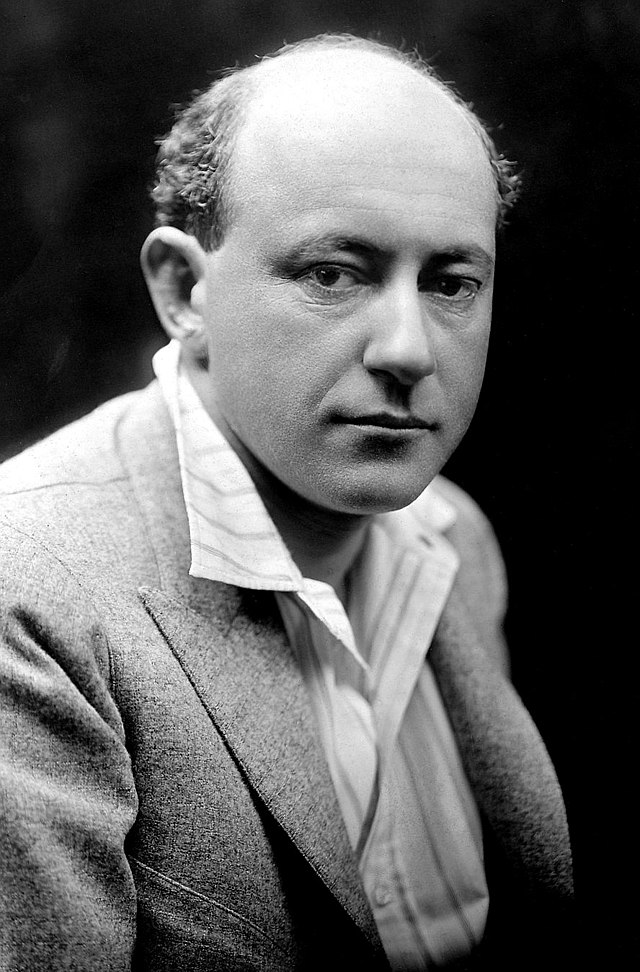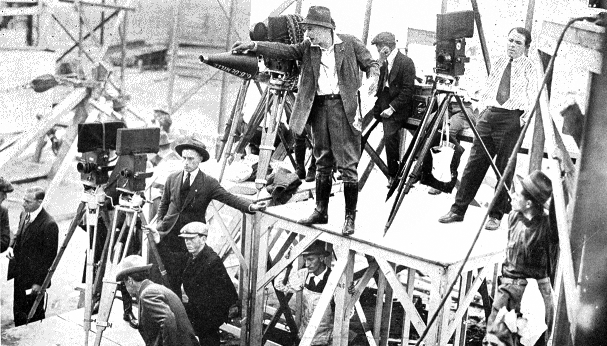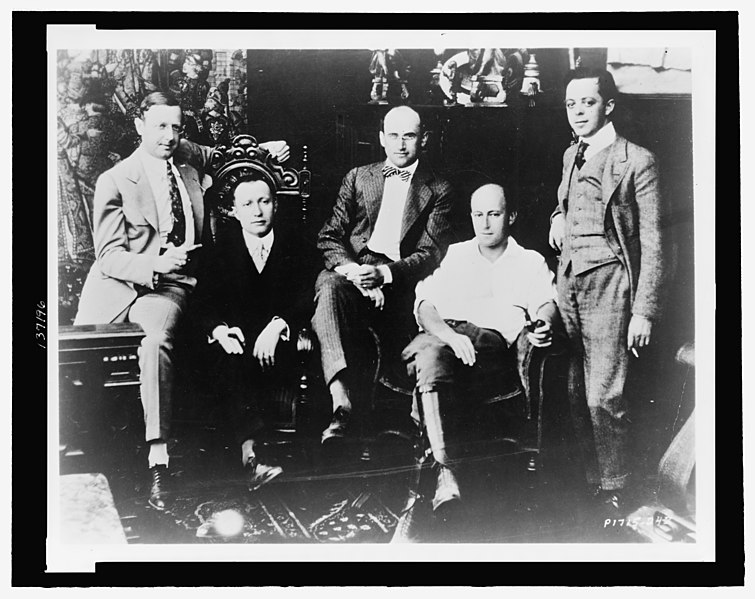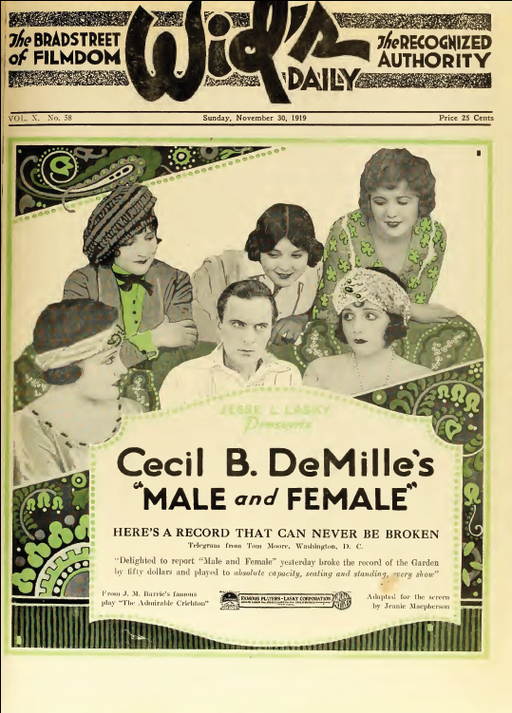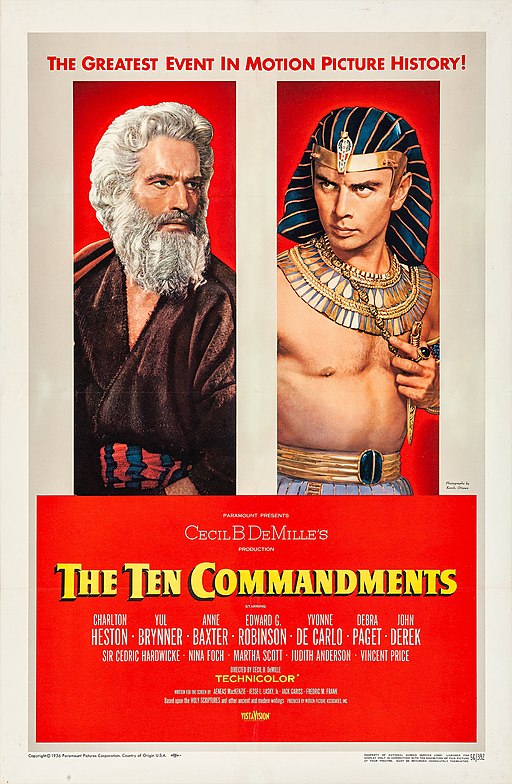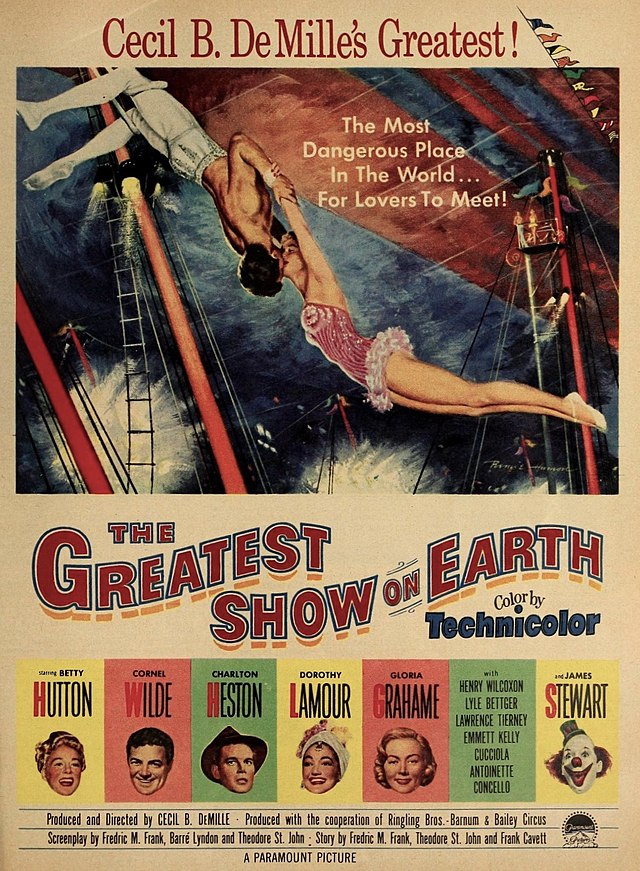Cecil B. DeMille
back| Full Name | Cecil Blount DeMille |
| Born | August 12, 1881 |
| Birthplace | Ashfield, Massachusetts, United States |
| Died | January 21, 1959 |
| Buried | Hollywood Forever Cemetery, Hollywood, Los Angeles, California, United States |
| Married to | Constance Adams DeMille (from 1902 until his death in 1959) |
| Children | Cecilia DeMille Presley - John Blount DeMille |
| Notable films | The Squaw Man (1914) - The Ten Commandments (1923) - The King of Kings (1927) - Cleopatra (1934) - The Greatest Show on Earth (1952) - The Ten Commandments (1956) |
Cecil B. DeMille
Maestro of Spectacle and Virtue
Cecil B. DeMille was a pioneering American filmmaker and one of the most successful directors in cinema history.
In 1913, DeMille co-founded the Famous Players Film Company (later Paramount Pictures) with Jesse L. Lasky and Samuel Goldwyn. He directed his first feature film, "The Squaw Man," in 1914, which is considered one of the first feature-length films produced in Hollywood.
One of his most iconic films is "The Ten Commandments" (1923), a silent epic that depicted the biblical story of Moses. This film set new standards for spectacle and special effects in cinema.
Related
Cecil B. DeMille (1881 – 1959)
Biography and Career Overview
Cecil Blount DeMille was born on August 12, 1881, in Ashfield, Massachusetts, to a family deeply entrenched in the world of theater. His father, Henry Churchill DeMille, was a renowned playwright and lay the foundation for Cecil's future career. Growing up amidst the glitz and glamour of the stage, Cecil developed a profound love for storytelling and spectacle from a young age.
After completing his education, DeMille embarked on his journey into the entertainment industry. Initially drawn to the theater like his father, he began his career as a stage actor and later transitioned into playwriting and directing. However, it wasn't long before the burgeoning world of cinema beckoned to him, offering new and exciting possibilities for creative expression.
The Birth of a Cinematic Visionary: In 1913, DeMille, along with his partners Jesse L. Lasky and Samuel Goldwyn, established the Famous Players Film Company, which would later evolve into Paramount Pictures. This pivotal moment marked the beginning of DeMille's illustrious career as a filmmaker.
Epic Productions and Cinematic Spectacle: DeMille's directorial debut came in 1914 with "The Squaw Man," a groundbreaking silent film that captivated audiences with its innovative storytelling and visual flair. It was the first feature-length film shot in Hollywood, setting the stage for DeMille's future as a pioneer in the industry.
Throughout the silent era, DeMille's name became synonymous with epic productions and cinematic spectacle. His films, such as "The Ten Commandments" (1923) and "The King of Kings" (1927), pushed the boundaries of filmmaking, employing grand sets, elaborate costumes, and larger-than-life narratives to transport audiences to distant lands and ancient civilizations.
Transition to Sound and Continued Success: As the film industry underwent the transition to sound in the late 1920s, DeMille adapted seamlessly, continuing to produce successful films that captivated audiences around the world. His 1934 film "Cleopatra," starring Claudette Colbert, showcased his ability to blend historical drama with lavish production values, earning critical acclaim and box office success.
Personal Life and Legacy: Outside of his prolific filmmaking career, DeMille led a rich and fulfilling personal life. In 1902, he married Constance Adams, with whom he shared a deep and enduring partnership until his passing. Together, they had two children, Cecilia and John, who would both go on to make their own contributions to the world of entertainment.
Cecil B. DeMille's legacy extends far beyond the silver screen. He was not only a visionary filmmaker but also a trailblazer whose impact on the industry continues to be felt to this day. His dedication to storytelling, coupled with his unwavering commitment to cinematic excellence, cemented his status as one of the most influential directors in the history of cinema.
Final Years and Passing: In his later years, DeMille continued to work tirelessly, leaving an indelible mark on the world of filmmaking with each new project. However, on January 21, 1959, Cecil B. DeMille passed away, leaving behind a legacy that would endure for generations to come. He was laid to rest at the Hollywood Forever Cemetery in Los Angeles, California, surrounded by the memories of a life lived in pursuit of artistic greatness.
Special Oscar for Cecil B. DeMille:
Grandiose Directing Style of Cecil B. DeMille:
Cecil B. DeMille's directing style is characterized by grandeur, spectacle, and a meticulous attention to detail. Throughout his career, he became known for his epic productions that captivated audiences with their lavish sets, elaborate costumes, and larger-than-life narratives. Here's an analysis of some key elements of DeMille's directing style:
- Spectacle and Grandeur: Perhaps the most defining feature of DeMille's directing style is his penchant for spectacle and grandeur. He spared no expense in creating visually stunning films that transported audiences to distant lands and ancient civilizations. Whether it was the opulence of ancient Egypt in "Cleopatra" or the sweeping landscapes of the American West in "The Plainsman," DeMille's films were always a feast for the eyes.
- Historical and Biblical Epics: DeMille was particularly drawn to stories with historical or biblical themes, which allowed him to indulge in his love for epic storytelling. His films often depicted iconic historical figures or events, such as Moses in "The Ten Commandments" or Jesus in "The King of Kings." DeMille's meticulous attention to historical detail, combined with his flair for drama, brought these stories to life in vivid detail.
- Morality and Redemption: Many of DeMille's films explored themes of morality, redemption, and the clash between good and evil. Whether it was the struggle between the Egyptians and the Israelites in "The Ten Commandments" or the battle between virtue and vice in "The Sign of the Cross," DeMille used his films to explore complex moral dilemmas and ultimately deliver a message of hope and redemption.
- Strong Characters and Performances: DeMille had a knack for crafting memorable characters and eliciting powerful performances from his actors. Whether it was Claudette Colbert's sultry portrayal of Cleopatra or Charlton Heston's commanding performance as Moses, DeMille's characters were larger than life, often embodying archetypal virtues or vices.
- Attention to Detail: DeMille was known for his meticulous attention to detail, both in the visual elements of his films and in the storytelling itself. He spared no expense in creating elaborate sets and costumes, ensuring that every frame of his films was visually stunning. Additionally, DeMille was known for his exhaustive research into the historical or biblical context of his films, striving for authenticity in every aspect of production.
Memorable Quotes from Cecil B. DeMille:
- "The greatest art in the world is the art of storytelling."
- "Creativity is a drug I cannot live without."
- "Give me any two pages of the Bible, and I'll give you a picture."
- "The person who makes a success of living is the one who sees his goal steadily and aims for it unswervingly. That is dedication."
- "I never make a picture unless the story has a good moral. I believe in moral. That's the way to win."
- "The only thing I ever feared was failing. It wasn't worth a damn, but it was a fear."
- "Pictures are like people. Some you like and some you don't like, and you've got to live with them, even if you don't like them."
- "The greatest love story is in the Bible."
- "God is on the side of those who have the most talent."
Cecil B. DeMille Award:
The Cecil B. DeMille Award is an honorary Golden Globe Award presented annually by the Hollywood Foreign Press Association (HFPA) in recognition of outstanding contributions to the world of entertainment. Named after the legendary filmmaker Cecil B. DeMille, the award was first introduced in 1952 to honor individuals who have made a significant impact on the entertainment industry through their work in film.
Recipients of the Cecil B. DeMille Award are chosen by the board of directors of the HFPA based on their lifetime achievements and contributions to the fields of film and television. The award is typically presented during the annual Golden Globe Awards ceremony, which honors excellence in both film and television.
The Cecil B. DeMille Award is considered one of the highest honors in the entertainment industry, and recipients are often esteemed figures who have left an indelible mark on the world of cinema. Past recipients of the award include iconic actors, directors, producers, and other industry luminaries, such as Walt Disney, Alfred Hitchcock, Audrey Hepburn, Steven Spielberg, and Oprah Winfrey, among others.
Winners of the Cecil B. DeMille Award are celebrated for their outstanding contributions to the entertainment industry and are recognized for their enduring impact on the world of film and television. The award serves as a tribute to the legacy of Cecil B. DeMille himself, whose pioneering spirit and artistic vision continue to inspire generations of filmmakers and storytellers.
Awards and Recognition:
Academy Awards (Oscars):
- DeMille won the Academy Award for Best Picture for "The Greatest Show on Earth" in 1953.
- He received the Irving G. Thalberg Memorial Award in 1950, which honors creative producers whose bodies of work reflect a consistently high quality of motion picture production.
- DeMille received an honorary Academy Award in 1952 for his distinguished contributions to the motion picture industry.
- Additionally, he was nominated for the Academy Award for Best Director for "The Ten Commandments" in 1957.
Golden Globe Awards:
- DeMille received the Cecil B. DeMille Award in 1953, which is named in his honor and is bestowed annually by the Hollywood Foreign Press Association for outstanding contributions to the entertainment industry.
Other Awards and Honors:
- In 1950, DeMille was honored with a star on the Hollywood Walk of Fame, recognizing his contributions to the motion picture industry.
- He received the Directors Guild of America Award for Outstanding Directing – Feature Film for "The Greatest Show on Earth" in 1953.
- Throughout his career, DeMille received numerous accolades from industry organizations, film festivals, and cultural institutions, honoring his legacy as one of the most influential filmmakers in cinema history.
Overview of Cecil B. DeMille Masterpieces:
1914: The Squaw Man: DeMille's directorial debut, "The Squaw Man" tells the story of a British aristocrat who flees to the American West after being falsely accused of a crime. There, he falls in love with an Indian woman and faces cultural clashes and personal challenges.
1915: The Captive: This silent drama follows the story of a French woman who is kidnapped by a Native American chief after her husband is killed. As she adapts to her new life, she forms a bond with her captor and confronts the prejudices of her own society.
1916: The Cheat: A tense drama that explores themes of betrayal and redemption, "The Cheat" centers on a woman who becomes entangled with a wealthy businessman to alleviate her financial troubles. However, her actions have dire consequences that test her moral integrity.
1917: Joan the Woman: This historical epic depicts the life of Joan of Arc, the French heroine who led the French army to victory against the English during the Hundred Years' War. Through stunning visuals and powerful performances, DeMille brings Joan's story to life on the silver screen.
1918: Old Wives for New: A romantic drama that delves into the complexities of love and marriage, "Old Wives for New" follows the marital struggles of a wealthy businessman who becomes entangled in a web of deceit and infidelity.
1919: Male and Female: Set against the backdrop of a desert island, "Male and Female" explores the dynamics of class and gender through the interactions of a group of shipwreck survivors. As they struggle to survive, their social masks begin to unravel, revealing their true selves.
1920: Why Change Your Wife?: A comedy of manners that examines the institution of marriage, "Why Change Your Wife?" follows a man who divorces his wife in search of a more exciting partner, only to realize that true happiness may have been closer than he thought.
1921: Forbidden Fruit: This provocative drama explores themes of temptation and desire as it follows the scandalous affair between a wealthy woman and a charismatic artist. As their relationship unfolds, they are forced to confront the consequences of their actions.
1922: Manslaughter: A gripping courtroom drama that delves into issues of justice and morality, "Manslaughter" follows the trial of a wealthy socialite who is accused of causing a fatal car accident while driving under the influence.
1923: The Ten Commandments: DeMille's monumental epic, "The Ten Commandments," retells the biblical story of Moses and the Exodus from Egypt. With its groundbreaking special effects and lavish production values, the film remains a cinematic masterpiece.
1927: The King of Kings: A cinematic retelling of the life of Jesus Christ, "The King of Kings" showcases DeMille's skill at crafting grand historical epics. Through stunning visuals and powerful performances, the film explores the teachings and miracles of Jesus, culminating in his crucifixion and resurrection.
1929: Dynamite: A gripping thriller that explores themes of corruption and redemption, "Dynamite" follows the story of a young woman who seeks vengeance against the criminals responsible for her father's death. As she uncovers the truth behind his murder, she finds herself drawn into a web of deceit and danger.
1932: The Sign of the Cross: Set in ancient Rome, "The Sign of the Cross" is a historical epic that explores themes of faith, persecution, and moral decadence. The film follows the persecution of Christians under Emperor Nero and the struggles of a Roman prefect torn between duty and conscience.
1934: Cleopatra: A lavish historical drama that chronicles the life of the legendary Egyptian queen, "Cleopatra" stars Claudette Colbert in the title role. Through opulent sets and costumes, DeMille brings ancient Egypt to life, capturing the intrigue and romance of Cleopatra's reign.
1936: The Plainsman: A Western epic that follows the exploits of Wild Bill Hickok and Buffalo Bill Cody, "The Plainsman" explores the tumultuous era of the American frontier. With its sweeping landscapes and thrilling action sequences, the film captures the spirit of adventure that defined the Wild West.
1942: Reap the Wild Wind: Set in the world of 19th-century maritime adventure, "Reap the Wild Wind" follows the exploits of a fearless woman who battles pirates and rival ship captains on the high seas. With its thrilling action and romantic intrigue, the film showcases DeMille's flair for spectacle.
1949: Samson and Delilah: A biblical epic that tells the story of the strongman Samson, whose betrayal by the beautiful Delilah leads to his downfall. With its grand set pieces and dramatic narrative, this film became one of DeMille’s biggest box-office successes.
1952: The Greatest Show on Earth: A behind-the-scenes look at the world of the circus, "The Greatest Show on Earth" follows the lives of performers and staff as they prepare for the big top extravaganza. With its star-studded cast and thrilling circus acts, the film captures the magic and excitement of the circus world.
1956: The Ten Commandments (1956): A remake of his 1923 silent film, "The Ten Commandments" in 1956 is arguably Cecil B. DeMille's most iconic work. Starring Charlton Heston as Moses, the film retells the biblical story of the Exodus with even grander scale and spectacle. It remains a cinematic classic, known for its stunning special effects and memorable performances.

